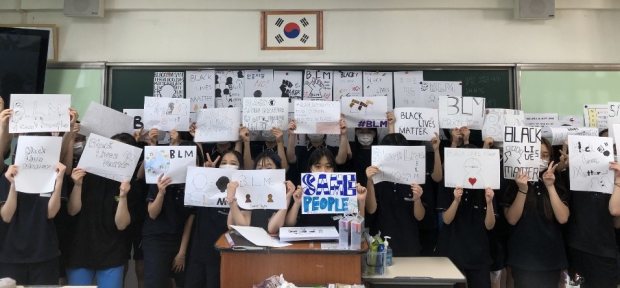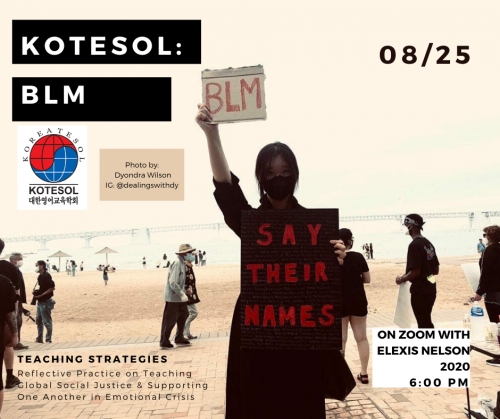
August 2020
This month's voice:
Elexis Nelson, "Teaching in the Wake of Social Injustice"
Introduction
By Lindsay Herron
Co-editor, KOTESOL Voices
I've been very proud over the past few years to see KOTESOL's growth as an organization dedicated to inclusion, equity, and social justice. From the foundation of the Social Justice SIG and the codification of KOTESOL’s non-discrimination policy half a decade ago to the more recent creation of the People of Color Teachers SIG, the Women and Gender Equality SIG, the Diversity Committee, the KOTESOL Code of Conduct, and—yes, even the publication of KOTESOL Voices, our organization continues to endeavor to foster community, belonging, professionalism, and mutual respect. I was thrilled when more than half of the National Council drafted and signed a Statement Against Racial Injustice in early June—and even more thrilled to learn Busan-Gyeongnam Chapter member Elexis Nelson was planning an online workshop on social justice education, directly addressing the BLM movement and its implications as we educate a new generation of global citizens. I immediately invited her to share her perspectives in this month's issue of KOTESOL Voices, and I was absolutely delighted when she accepted.
What does it mean to be a Black educator in these tumultuous times? In particular, how does a Black educator navigate the tensions of race, equity, and social justice in Korea, a country with no anti-discrimination laws, that lacks a definition of racial discrimination, in which six attempts to pass anti-discrimination policies have failed in the past thirteen years, and which in 2018 was called out by the National Human Rights Commission of Korea as having a "serious racism problem"? Elexis's thoughtful reflections below reveal a candid glimpse into her own experiences as a Black woman, as an expat, and as a teacher, while also offering hope for the future. We all know our students are capable of breathtaking, inspiring acts of compassion and strength; Elexis's words solidify this, her story rich with the promise of greater empathy and solidarity in the world as our students come of age and begin to participate in the global community.
Teaching in the Wake of Social Injustice
By Elexis Nelson
Social justice holds a permanent residency within me. As someone who grew up always knowing the uphill battle I’d face, I chose to never focus on the disadvantages. I knew that my unique background would become my propeller. At 22, I moved to Korea and pursued teaching as a career. Though I had good intentions, I often opted to abandon teaching the students about my identity as an African American woman. But I can never shed my brown skin, nor would I. Being Black is something I can never take off. It’s the blessing that society has burdened. Being me means also carrying my emotions towards social injustice. It means continuing my activism even when I’m not in the warzone.
The racist events taking place all over the world, but especially in the U.S., have affected me in many ways. I’ve screamed, cried, chanted, cheered, and cried some more. While I have always dealt with social injustices, living in Korea creates a bit of cultural shift that is all very new to me. A community of indifference surrounds me and quarantines me in four walls of isolation.
When preparing lessons for my students, I always reflect on how authentic and unique my materials should be. I ensure the use of minorities as well as multicultural examples of English. Some would have you believe that social justice has no place in an EFL classroom; they’re wrong. Learning about the lives of other humans is just basic empathy, and that transcends linguistic barriers. When being authentic in your teaching, you have no choice but to include the cultural tolls that are imposed on the language. Words have meaning; all words are valuable. By giving your students the words to form their thoughts, you give them freedom of speech.
At all ages, humans should learn the plagues of the global world. Teachers should take the lead in ensuring they equip students with the tools to think for themselves. When asked by my school to teach students about the Black Lives Matter movement, I hesitated in my approach. I taught them with a strained voice, and I braced myself for their innocent-but-harmful reactions. And… they wanted to learn more, do more! They did their own research; they illustrated their thoughts into protest signs. These wonderful language learners spoke to my heart and the pain of my ancestors. They did not look on with pitiful glances, but with compassion for others. In teaching my students about BLM and other similar issues surrounding inhumanity, my motivation is to break down walls and bridge a gap between “us” and “them.” In doing so, students become much wiser because they don’t fear the unknown; they are not embarrassed by ignorance. Teaching is a blessing and therapeutic because every day I have the opportunity to create social justice warriors. Every day they surprise me.
About the Author
 Elexis Nelson is an American teacher originally from Flint, Michigan, USA. She’s taught English through the EPIK program for the past four years. With a B.A. in linguistics from the University of Michigan, Nelson uses her acquired knowledge of English to teach in public schools across Busan. Outside of the classroom, Nelson shares Korean travel tips and vlogs under the moniker "Your Bae From Busan." Nelson intertwines her desires for students’ fluency with her passions for increasing tourism and foreign residency in Busan. Through KOTESOL, Nelson intends to assist other teachers in developing new teaching tactics and reflective-practices in the classroom. On August 25, Nelson will be hosting a workshop for teaching global social justice at every academic level.
Elexis Nelson is an American teacher originally from Flint, Michigan, USA. She’s taught English through the EPIK program for the past four years. With a B.A. in linguistics from the University of Michigan, Nelson uses her acquired knowledge of English to teach in public schools across Busan. Outside of the classroom, Nelson shares Korean travel tips and vlogs under the moniker "Your Bae From Busan." Nelson intertwines her desires for students’ fluency with her passions for increasing tourism and foreign residency in Busan. Through KOTESOL, Nelson intends to assist other teachers in developing new teaching tactics and reflective-practices in the classroom. On August 25, Nelson will be hosting a workshop for teaching global social justice at every academic level.



